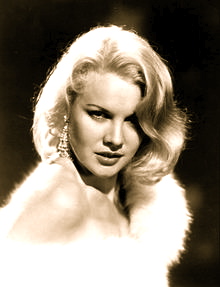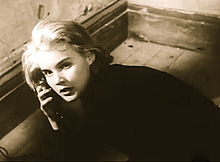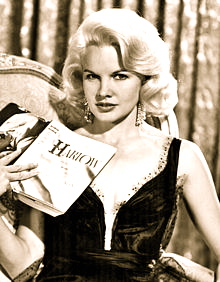Carroll Baker
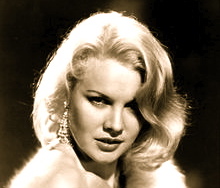
What’s My Line? – Carroll Baker; PANEL: Phyllis Newman, Tony Randall
Many thanks to Steve M. Russo for providing this episode in much higher quality than the version I had previously. Folks interested in high quality, well packaged, well-edited DVDs of WML (and other game shows) can contact him directly for more information at RetroTVFestival@comcast.net.
Carroll Baker (born May 28, 1931) is an American film, stage, and television actress. Throughout the 1950’s and 1960’s, Baker’s range of roles from naive ingenues to brash and flamboyant women established her as both a serious dramatic actress and a blonde bombshell. While performing on Broadway in 1954, she was recruited by director Elia Kazan to play the lead in Tennessee Williams’s Baby Doll (1956). Her role in the film as a sexually-repressed Southern bride lent Baker overnight notoriety and earned her BAFTA and Academy Award nominations for Best Actress, as well as a Golden Globe award for Most Promising Newcomer that year.
Other notable early roles included Giant (1956) and But Not for Me (1959), as well as westerns such as The Big Country (1958), How the West Was Won (1962), and Cheyenne Autumn (1964). In the mid-1960’s, Baker became an established sex symbol for her roles in The Carpetbaggers (1964), Sylvia (1965), and Harlow (1965). She relocated to Italy in 1966 amidst a legal battle over her contract with Paramount Pictures, and spent the following ten years starring in hard-edged horror and giallo thrillers, including Umberto Lenzi’s Paranoia (1969) and Knife of Ice (1972), before re-emerging for American audiences as a character actress in Andy Warhol’s cult film Bad (1977).
Baker worked prominently in television throughout the 1980’s and 1990’s, appearing on the series Murder, She Wrote; L.A. Law, and Roswell, and had supporting roles in the films Ironweed (1987), Kindergarten Cop (1990) and The Game (1997). She formally retired from acting in 2002. In addition to acting, Baker is also the author of three books.
Early Life
Carroll Baker was born and raised in Johnstown, Pennsylvania, in a Roman Catholic family, the daughter of Virginia (née Duffy) and William Watson Baker, who was a traveling salesman. She is of Polish descent, which has given rise to a rumor that her birth name was Karolina Piekarski. However, this currently cannot be substantiated by known records. Baker’s parents separated when she was eight years old, and she moved with her mother and younger sister, Virginia, to Turtle Creek, Pennsylvania. According to Baker, her mother struggled as a single parent, and the family was poor for much of her upbringing.
Baker attended Greensburg Central Catholic High School in Greensburg, Pennsylvania, where she was a debate team member and active in the marching band and school musicals. At eighteen, she moved with her family to St. Petersburg, Florida, where she attended St. Petersburg College (then St. Pete Junior College). After her first year in college, Baker began working as a magician’s assistant in the vaudeville circuit and joined a dance company, working as a professional dancer. In 1949, Baker won the title of Miss Florida Fruits and Vegetables. In 1951, Baker moved to New York City, where she rented a dirt floor basement apartment in Queens. She worked as a nightclub dancer and also took stint jobs as a chorus girl in traveling vaudeville shows, which took her to Windsor, Detroit, and New Jersey.
In 1952, Baker enrolled at the Actors Studio and studied under Lee Strasberg. There, she was a classmate of Mike Nichols, Rod Steiger, Shelley Winters, and Marilyn Monroe; she also became close friends with James Dean, and remained friends with him until his death.
Career – Early career: 1952–1957
After appearing in television commercials for Winston cigarettes and Coca-Cola, Baker was featured in an episode of Monodrama Theater performing a monodramatic piece, which was broadcast in 1952 on the DuMont Network. The following year, she made her film debut with a small walk-on part in the musical Easy to Love (1953). This led to her landing roles in two Broadway productions: Roger MacDougall’s Escapade in the fall of 1953, and Robert Anderson’s All Summer Long, opposite Ed Begley, which ran from September to mid-November 1954. In 1955, she screen tested and auditioned for the lead role in Picnic, but lost the part to Kim Novak. She was also considered for the lead in Rebel Without a Cause (1955) after James Dean recommended her for the part to director Nicholas Ray, which she turned down.
Baker’s first major screen role was the supporting part of Luz Benedict II in Giant (1956), opposite Elizabeth Taylor, Rock Hudson, and James Dean, in his final role. According to Baker, she had been offered numerous leading parts in feature films before that point, but chose to debut in a supporting role in Giant because she was “insecure” and “wanted to start out a little less ‘profile.'” Giant was largely filmed in the small town of Marfa, Texas in 1955; Baker recalled her experience on set, saying that she and James Dean were both “enamored of” Rock Hudson and Elizabeth Taylor while filming: “I considered them the glamorous part of old Hollywood,” she recalled. “And this was a town that had one paved street, they had one hotel, and we all had to eat [together] in the dining room.”
Simultaneously, Baker was cast as the title character in Elia Kazan’s Baby Doll (1956), a role initially intended for Marilyn Monroe. Tennessee Williams, who had written and developed the screenplay based on two of his one-act plays, wanted Baker to play the part after seeing her perform a scene from his script at the Actors Studio; likewise, Kazan had been impressed by her performance in All Summer Long on Broadway the year prior. Shot in Benoit, Mississippi directly after Baker had completed Giant, her role in the film as a sensuous teenage bride to a failed middle-aged cotton gin owner brought Baker overnight fame and a level of notoriety even before the film’s release. In the fall of 1956, artist Robert Everheart, under contract with Warner Bros., constructed a 135-foot billboard in Times Square promoting the film, depicting the now-iconic image of a scantily-clad Baker lying in a crib sucking her thumb. The controversial advertising campaign for the film caused a preemptive backlash from religious groups, and on December 16, 1956, Cardinal Spellman of St. Patrick’s Cathedral denounced the film and advised his parish against seeing it. A formal condemnation by the Roman Catholic National Legion of Decency ensued, who lambasted it as “grievously offensive to Christian and traditional standards of morality and decency.”
In spite of this, Baby Doll opened to strong box office sales, grossing $51,232 in its first week at the Victoria Theater, and Baker received immense critical praise for her performance. Variety said that her performance “captures all the animal charm, the naivete, the vanity, contempt and rising passion of Baby Doll,” while Bosley Crowther of The New York Times praised Baker’s ability to exhibit “a piteously flimsy little twist of juvenile greed, inhibitions, physical yearnings, common crudities and conceits.” Baby Doll established Baker as an A-list actress and would remain the film for which she is best remembered. She was nominated for an Academy Award for Best Actress for her performance, a Golden Globe for Best Actress, and won a Golden Globe for Most Promising Newcomer, which she shared with Jayne Mansfield and Natalie Wood. The performance also earned her a Film Achievement Award from Look magazine, as well as the title “Woman of the Year” in 1957 from Harvard University’s Hasty Pudding Club. She appeared on the cover Life Magazine in June 1956.
Contract battles and Westerns: 1958–1963
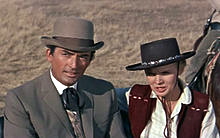 Baker with Gregory Peck in The Big Country (1958)
Baker with Gregory Peck in The Big Country (1958)
After the success of Baby Doll, Baker was subsequently offered parts in The Brothers Karamazov (1958), Too Much, Too Soon (1958), and The Devil’s Disciple (1959). She refused to make Too Much Too Soon, so Warner Bros. put her on suspension, which prevented her from starring in The Brothers Karamazov (1958) at MGM.[27] Baker was also chosen by MGM for the lead in Cat on a Hot Tin Roof (1958) and by Twentieth Century Fox for The Three Faces of Eve (1957) but her contract with Warner Bros. again prevented her from accepting the roles. Tensions between Baker and the studio escalated further when she went against their wishes by appearing in Arms and the Man on stage. Baker commented on the effect of the system on her career, saying: “I came in at the end of the big studio system. I still had a slave contract and they were willing to put you in almost anything they had.”
After her suspension with Warner Bros. was lifted, Baker appeared in William Wyler’s western epic The Big Country (1958). The film was well received by critics, though the shoot was described as “problematic”: Baker was four months pregnant at the time and had to wear restraining garments, and director Wyler reportedly had her on the verge of tears after forcing her to repeat the same take over sixty times only to use the first one. She followed The Big Country with lead roles in two romances, portraying a nun in The Miracle (1959) co-starring a young Roger Moore, and in But Not for Me (1959), a comedy with Clark Gable. The New York Times praised Baker’s performance in But Not for Me, saying: “Miss Baker, being a young lady who not only has looks but also can act, makes you understand why Mr. Gable would like to cheat a little bit on Father Time.”
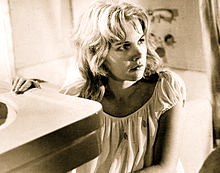 Baker in Something Wild (1961); the controversial depiction of her as a suicidal rape victim was credited with nearly ending her career
Baker in Something Wild (1961); the controversial depiction of her as a suicidal rape victim was credited with nearly ending her career
Following a string of major Hollywood productions, Baker was cast in the experimental film Something Wild (1961), directed by her then-husband Jack Garfein. In the gritty independent drama, she plays a young college student from the Bronx who is raped one night in St. James Park, and later held captive by a Manhattan mechanic (Ralph Meeker) who witnessed her subsequent suicide attempt. In preparation for her role, Baker lived alone in a boarding house in New York’s Lower East Side, and got a job as a department store salesgirl; her method approach to the role was profiled in LIFE magazine in 1960. Critical reaction to the film was largely negative, though Film Quarterly cited it as “the most interesting American film of its quarter,” and the most underrated film of 1961. However, its controversial depiction of rape led to critical backlash and public criticism, and the film has been oft-credited as almost halting Baker’s career. The same year, she portrayed Gwen Harold in Bridge to the Sun, a 1961 production by MGM based on the 1957 best-selling autobiography of a Tennessee-born woman who married a Japanese diplomat (portrayed by James Shigeta) and became one of the few Americans to live in Japan during World War II. While only a modest success at the box office, the film was well received by critics and was America’s entry at the Venice International Film Festival.
After this, Baker appeared in the independent British-German film Station Six-Sahara (1962) as a woman who provokes tensions at an oil station in the Sahara Desert, as well as the blockbuster western epic How the West Was Won (1962), opposite Debbie Reynolds and former co-stars Gregory Peck and Karl Malden. In addition to film acting, Baker also found time to appear again on Broadway, starring in the 1962 production of Garson Kanin’s Come on Strong in the fall of that year. In 1963, Baker relocated permanently with then-husband Jack Garfein and their two children to Los Angeles, where she based herself for the next several years. She traveled to Kenya to film Mister Moses in 1964, where publicized rumors spread that she and co-star Robert Mitchum were having an affair, which they both vehemently denied. Another story, now considered apocryphal, had it that a Maasai chief in Kenya offered 150 cows, 200 goats, sheep, and $750 for her hand in marriage. She subsequently appeared with Maasai warriors on the cover of Life’s July 1964 issue.
Sex symbol roles: 1964–1966
In 1964, Baker portrayed a pacifist Quaker schoolteacher in John Ford’s Cheyenne Autumn (1964), and received critical acclaim for the role. She then had a supporting role as Saint Veronica in George Stevens’ The Greatest Story Ever Told (1965), before portraying a cynical, alcoholic movie star in the 1964 hit The Carpetbaggers, which brought her a second wave of notoriety in spite of the film’s lackluster reviews. The New York Times called the film “a sickly sour distillation” of the source novel, but said Baker’s performance “brought some color and a sandpaper personality as the sex-loaded widow.” The film was the top moneymaker of that year, with domestic box-office receipts of $13,000,000 and marked the beginning of a tumultuous relationship with the film’s producer, Joseph E. Levine.
Based on her Carpetbaggers performance, Levine began to develop Baker as a movie sex symbol, and she appeared posing in the December 1964 issue of Playboy. She was subsequently cast by Levine in the title roles of two 1965 potboilers— Sylvia, as an ex-prostitute and con artist, and as Jean Harlow in Harlow. Baker appeared on the cover of the Saturday Evening Post on their November 2, 1963 issue dressed as Harlow, promoting the film’s upcoming production. In 1965, she became an official celebrity spokesperson for Foster Grant sunglasses and appeared in advertisements for the company. Baker likened this era of her career to “being a beauty contest winner [as opposed to] an actress.”
Despite much pre-publicity, Harlow received a lukewarm response from critics; Variety referred to Baker’s portrayal of Harlow as “a fairly reasonable facsimile although she lacks the electric fire of the original.” Relations between Baker and Levine eventually soured, leading Baker to sue Levine over her contract with Paramount Pictures. She was ultimately fired by Paramount and had her paychecks from Harlow frozen amidst the contentious legal battle, though she was eventually awarded $1 million in compensation. “Joe Levine behaved like he owned me,” said Baker in 1977. “My husband thought it was all terrific as long as I kept bringing in the money. I started objecting to everything, but it was too late. The sex-symbol image had already started. I turned down parts and they blacklisted me. The press attacked me viciously at every opportunity. I came very close to suicide.”

